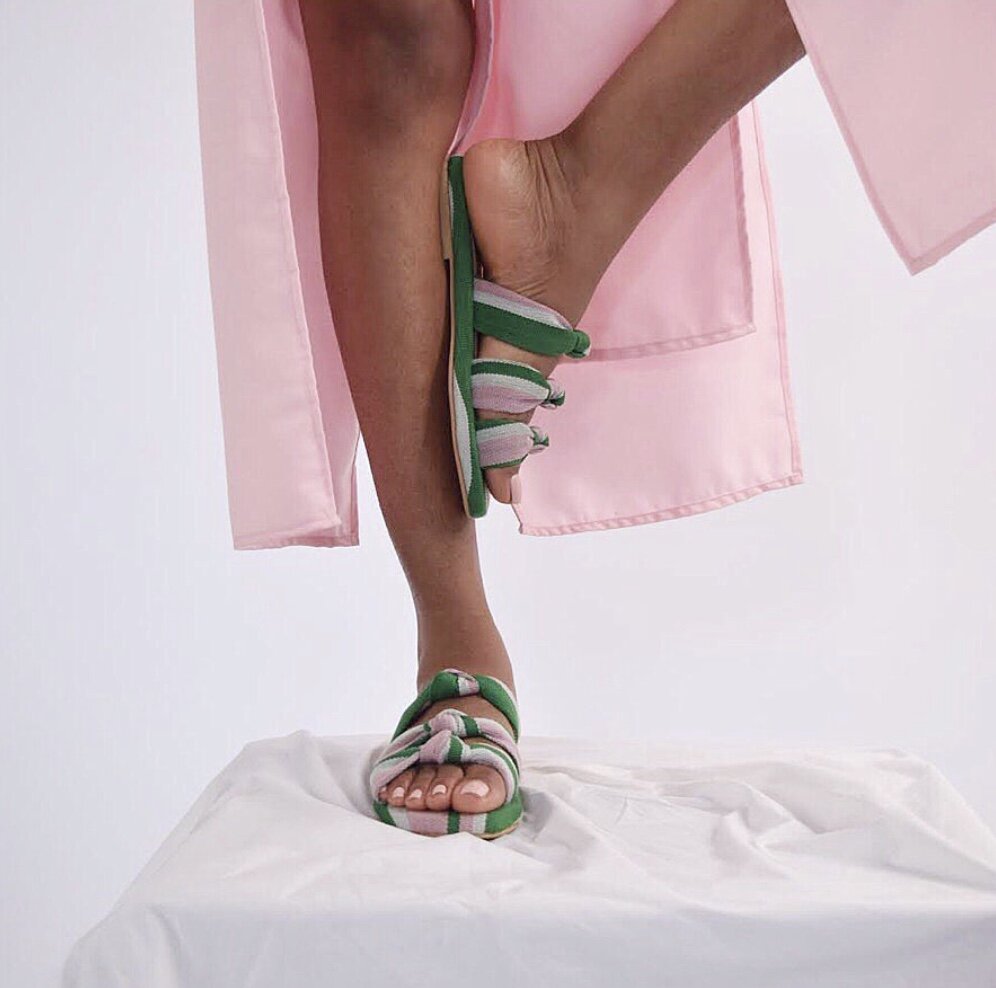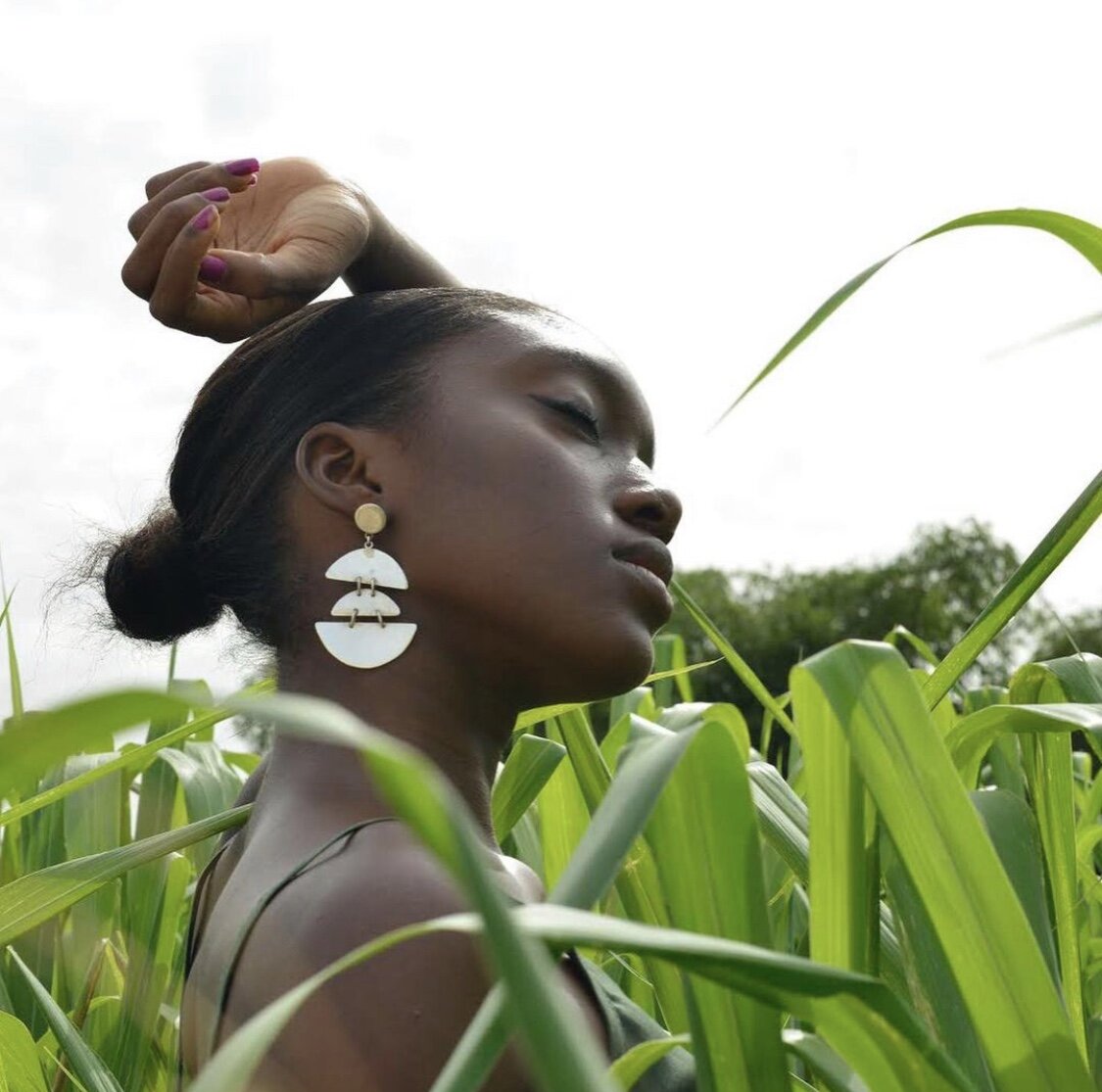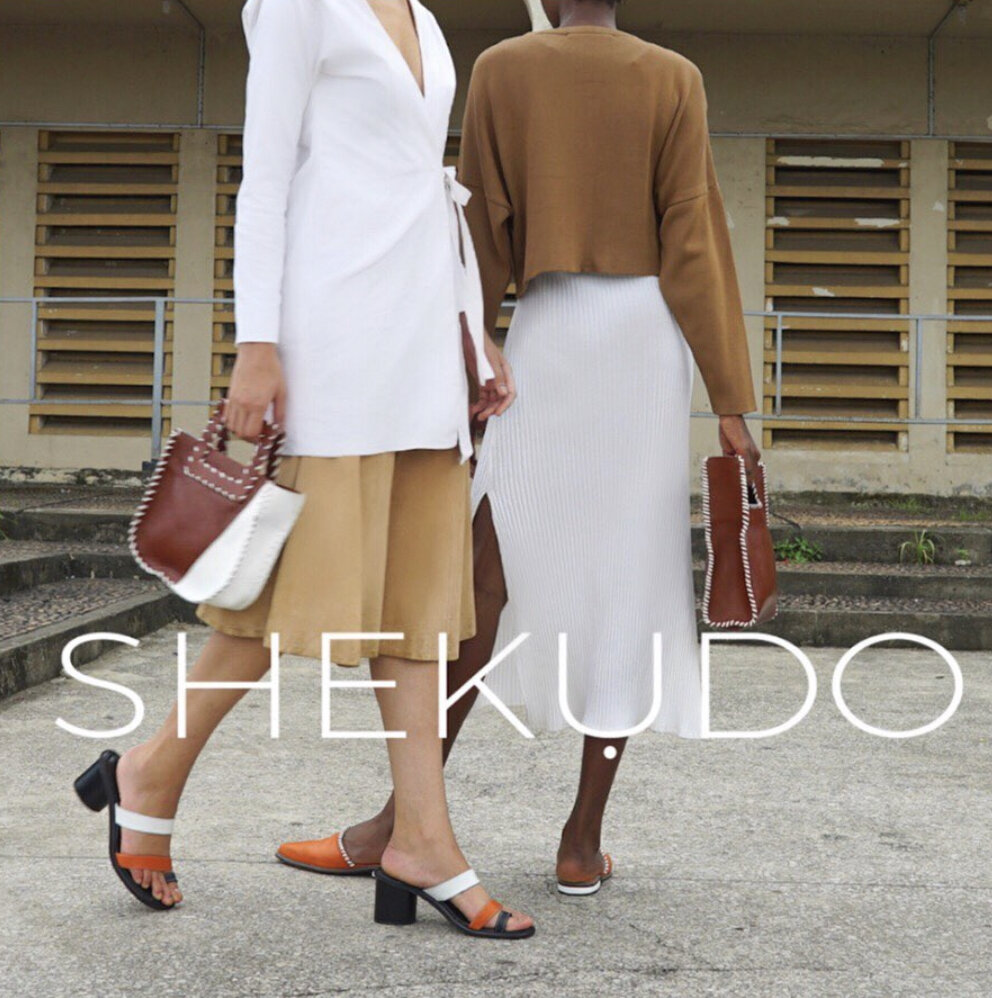The Journey of Akudo Iheakanwa, Founder Of Shoes And Accessories Brand Shekudo
We are happy to introduce you to the first guest of our spotlight series: Akudo Iheakanwa. Akudo is the creative director behind Shekudo, a women’s shoes, bags and jewellery brand proudly showcasing a range of Nigerian craftsmanship. We spoke to her about traditional weaving, shoemaking and silver smithery below.
The brand's fresh new aesthetic started out 3 years ago in vibrant Lagos after initially being a clothing line in Akudo’s hometown Sydney. The name Shekudo was inspired by Akudo and her friend Shetu Bimpong, hence “She-kudo”. Today the brand is unapologetically taking the global stage with a future full of promise.
Akudo shared all the details about her journey and building a brand that matters...
How would you describe yourself?
I’m a 31 year old confident woman, who’s nimble and optimistic. I'm always able to adapt to the different situations I face. I believe there is always an opportunity to learn and a chance to grow as an individual as well as a business in every single difficult situation.
You decided to move from Australia to Nigeria 3 years ago. What was your mindset when you took that big decision?
Moving here was a very big choice for me. I was working in community development and youth work and I loved it so much. But I needed a change. I was getting very restless in Australia. I grew up there but I couldn’t get used to the idea of just getting a job, saving, then buying a house and so on. I understand it works for a lot of people but it wasn't something I wanted for me. I felt like things were getting a bit too easy and comfortable. I’m an adventurer, I like adrenaline!
I had this brand that I had started with my friend a long time ago. I just thought, “I want to continue this brand! I don’t want to let it go”. I thought it had a lot of potential. We were just looking and doing things the wrong way. So I started again. I was just totally excited and ready for something new. That led me to where I am.
Did you have a clear vision of what you wanted to do?
I had a plan. I was actually thinking of continuing with youth work and community development like what I was doing in Australia and working in sexual health education on top of that. I was doing my research for Shekudo at the same time. To be honest, I can’t remember how but Shekudo started to snowball and became the main focus at some point. Obviously, it was also something that I could earn an income in as soon as I got here. So I dived into it.
I had a plan for my stay but I did not have that much of a clear plan for the brand. I just knew that I needed to refresh the brand. However, one thing was for sure: I wanted to showcase all the amazing talents and craftsmanship I had seen while travelling across Nigeria when I arrived. I was thinking “How can I do it? How do I start?” and I didn't want to do clothing at the time. I really wanted to focus on footwear and accessories as I saw them like pieces of art. I could showcase the beautiful talents of many different people in just one shoe.
I also realised that shoemaking was a big thing here, which I had not noticed before. When I used to come to Nigeria, I had no idea shoemaking was such a huge part of manufacturing. So I decided I would have my pieces manufactured here and things just started to grow and expand.
As a lot of entrepreneurs will find, things just take shape as you go along. They take form on their own, then you can have a bit of a better idea of what you want. It's really beautiful. I've found that good things can come out of spontaneity, I try not to be too rigid.
What message do you want to convey with Shekudo? What do you want to tell the world through your brand?
There are so many things. I want people to see the abilities we have here in Nigeria. I want to create modern products that can be enjoyed locally as well as internationally. I want my products to tell the story of this ever growing small scale industry that we have here. I want to show its potential to be something much bigger.
On a more personal level, I know it's not great but as a kid growing up in Australia, I have always felt like I had to prove that my Nigerian side has more to offer because I would always think that people were judging me. This is something a lot of people would not understand but there was discrimination. I noticed it a lot more as I got older. My dad, for example, was a fantastic businessman, very strong, very capable but he always had to prove himself because he was never Australian enough. I noticed that a lot more as I got older. I was going through a lot during my high school years. You don't realise but these little comments that students and people make about you stick with you in very funny ways. They would always talk badly about Nigeria in the media: scams, criminals… But that’s not all of Nigeria! We've got a lot to show. I never felt like I had to prove that for my Australian side, my mom's side. Actually, no one ever thought I was Australian when they first saw me because I have black skin.
I always felt like I had to show that I had more to offer. If I'm being honest it has been a part of this journey. I was thinking “Let me go and see what's going on in my dad's part of the world. Let me show what we have beyond the great music and the great food.”
I was always defending Nigeria. Obviously, living here you can see that there is a lot of corruption and madness going on.And It can be really frustrating because you are trying to promote a country that is not always on your side.
But I don’t lose sight of my mission. I’m here to really showcase the potential we have as a brand, as a country and to push our story to the world. That's my vision. We want to show this lovely modern eclectic brand that can rival brands in New York or in Europe, not just producing fun little shoes with African prints. We want to be more and to be globally recognized. I'm really on a mission to bring changes to the business and make sure that we are strong and that we come with the quality to align with international brands.
And also I love women! I think as a woman, I just have this passion to witness this global community of women around the brand. They are connecting together through these wonderful crafts that are connecting them to a part of Africa.
How was it to start a business as a female entrepreneur, when you arrived in Nigeria?
It was tough for sure! I was navigating a landscape which I hadn't been back to for over a decade. On top of that I came as a young person. I had to be very careful of how I spoke to people, especially my elders. Generally in Australia, if someone talks down to you, you stand up for yourself. It’s not the same here, you have to get respect. You have to remember you are in a completely different country, in a different culture, with different rules and traditions.
A lot of the guys I work with are older than me. They are 15, 20 years older. Even though I had to make sure they do their job well, on the other hand I had to be mindful of how I spoke to them. I had to make sure I respect them because they’ve been doing this for years. I might have my opinions, they might have theirs but we had to work it out with respect. I did get into a few arguments here and there. But that was a big learning curve for me. It was tough but I had to remember where I was and be mindful of other people’s journey. Anyhow I’m deeply happy and thankful I came here, not just for business but for my own personal growth. I have learnt a lot! And now people are taking me seriously because of the way I’m handling the business and the brand.
There is also the way you dress. As much as I don’t think it should be a defining factor about my personality - I am a feminist - I still have to be very careful on how I dress. You have to consider the different communities around you. They might be muslim or very traditional Nigerian communities. I couldn’t just walk in those communities dressed how I would normally on a beach day just because it’s very hot. Plus, as markets here can sometimes be located in slightly rough areas, it’s not always conducive for a young woman to move around on her own. You have to be very thick-skinned when people are calling you out or grabbing you to come see their products for example.
What would you say your major challenges are?
A big one here is time. People are not very good with time management here. Making people understand the urgency of a request is not an easy job. Even when you try to stress something to someone it still doesn’t have an impact.
I would add following up and communication as well. You have to keep track of every detail otherwise you can find out that a request you made is not done weeks later. We had an incident with one of our jewelry designs once. It was only when I was organizing the pick up at the artisan’s workshop that he told me that he ran out of silver and he couldn’t make it. Because we’ve been focusing on a job and did not keep an eye on this one we ended it up with a three weeks delay for that piece. Plus, the artisan was afraid to tell me that he ran out of silver because he didn’t want to make me upset. Communication can also be a challenge when people don't want to talk for fear of getting in trouble, or displeasing you. And that's how a lot of people are raised here. That’s a challenge for me.
Then lastly, support is always a challenge for us. I was approved for a business loan over a year ago, to help me expand the business because we've been doing very well. But we have never seen the money until now. That loan would have helped to get machinery but that money is gone and there's no one to contact to make a formal complaint to the organisation.
There are different little things like that but we're getting there. We try to solve new challenges one day at a time. There's always a way.
What have been your toughest times?
My toughest times have probably been the beginnings. I was doubting a lot, I was not sure about the brand. I was thinking “Is this a stupid idea? Who's going to like it? How do I price this product so I don't undercut myself? But I don't want to charge too much”. Then obviously as the business grows and people are getting to know you, you're not able to pay yourself a salary. All the money goes into production, materials and paying your team. I wasn't able to pay myself a salary for about six to nine months, or maybe more. Then there were some days when I couldn’t even buy food. It's not even a joke (laughs). I remember I was so skinny at one point, I was just running around trying to keep the business running. By that time, the constant stress of not knowing if I would be able to get money from one week to the next kept me thinking “Is it really worth it? Why am I putting myself through this?”. That was a big thing for me
However, I kept being positive in those times. I knew things were going to get better. I truly believe the universe is always listening: you get out what you put in. And I put in a lot of work. I questioned what I was doing “What can I learn from this? How can I get better? What can I do to change the current circumstances? I am very happy to be able to see the benefits now.
Fortunately, there are always celebration moments despite the difficult times. What do you see as your biggest win so far? What are you most proud of?
We have so many! I find that I don’t celebrate them enough. Take the publications in those famous magazines for example. I used to buy Vogue or Grazia magazines in Australia. Now, we've been featured in so many of them. I am hugely grateful for it.
Other big wins were being selected to go to Paris Fashion Week, being invited to New York Fashion Week, working with designers I look up to, the work we're doing with EFI organisation. I've admired their work for years. It's quite funny to see how it all comes back around.
And another one, we won an award last year for African footwear designer of the year. We had just started out and people had nominated us because they saw the potential behind the brand. All those things truly make me happy and give me the motivation that I need to keep pushing on. I am happy our work is contributing to the economy and showcasing a different side of Nigeria.
What words of wisdom do you live by?
Do everything with love and joy. Sometimes people say “You have to make money”. But I think it will come on its own if you’re focusing on growing that one thing you love. I don’t say it’s always easy. Trust me, some days you won't feel like you're doing it with love and joy. I try hard to see the positive in everything. You can't take anything seriously. You have to always ask yourself “Is it really the end of the world if this doesn't happen? Maybe I've made somebody else's day, just because X didn’t happen.” - just trying to find the silver lining and the lessons to learn in everything.
One last thing is not having too many expectations. This is something I have learned here in Nigeria. You can be hopeful and want the best but you need to be realistic. Otherwise you make yourself disappointed wanting things in a specific way. Be open to change and adaptable to situations.
How does Ndaane inspire you?
I love it! The word inspires me. It makes me think of the Greek word: Meraki*.
It reminds me of where I take my inspiration. I am inspired by my parents, what they've done, how much they've pushed in their lives to get where they've come to. I just want to do this as well. Not just for myself but for them to show them that all they sacrificed is not in vain. I want to represent my homes with love: Nigeria and Australia. Nigeria is a fantastic place to be with all its flaws. I'm forever grateful for the lessons I've learned here, whatever I can give back I'm happy to do it.
*Meraki means doing something with soul, creativity, or love, to put something of yourself into what you’re doing








